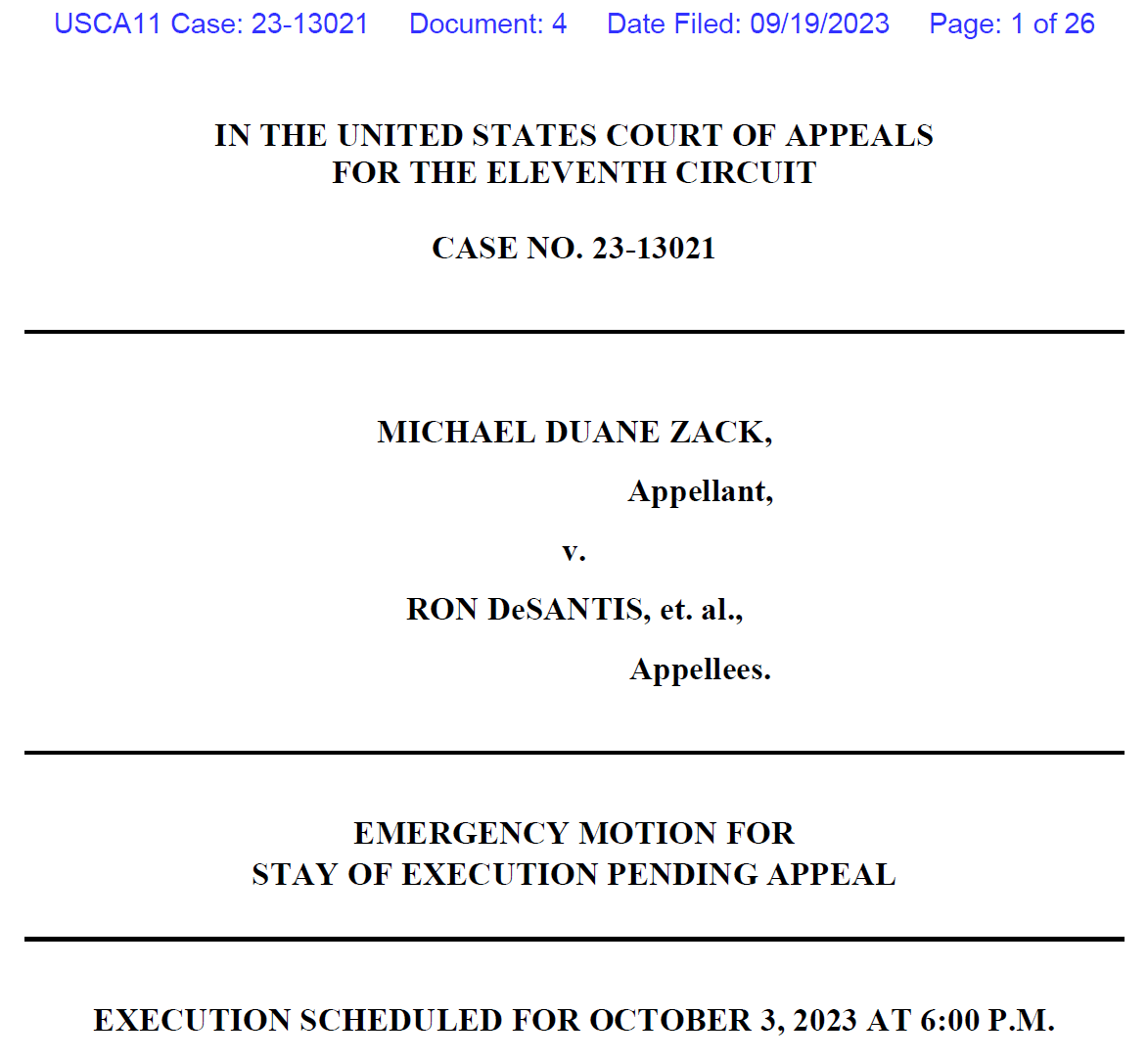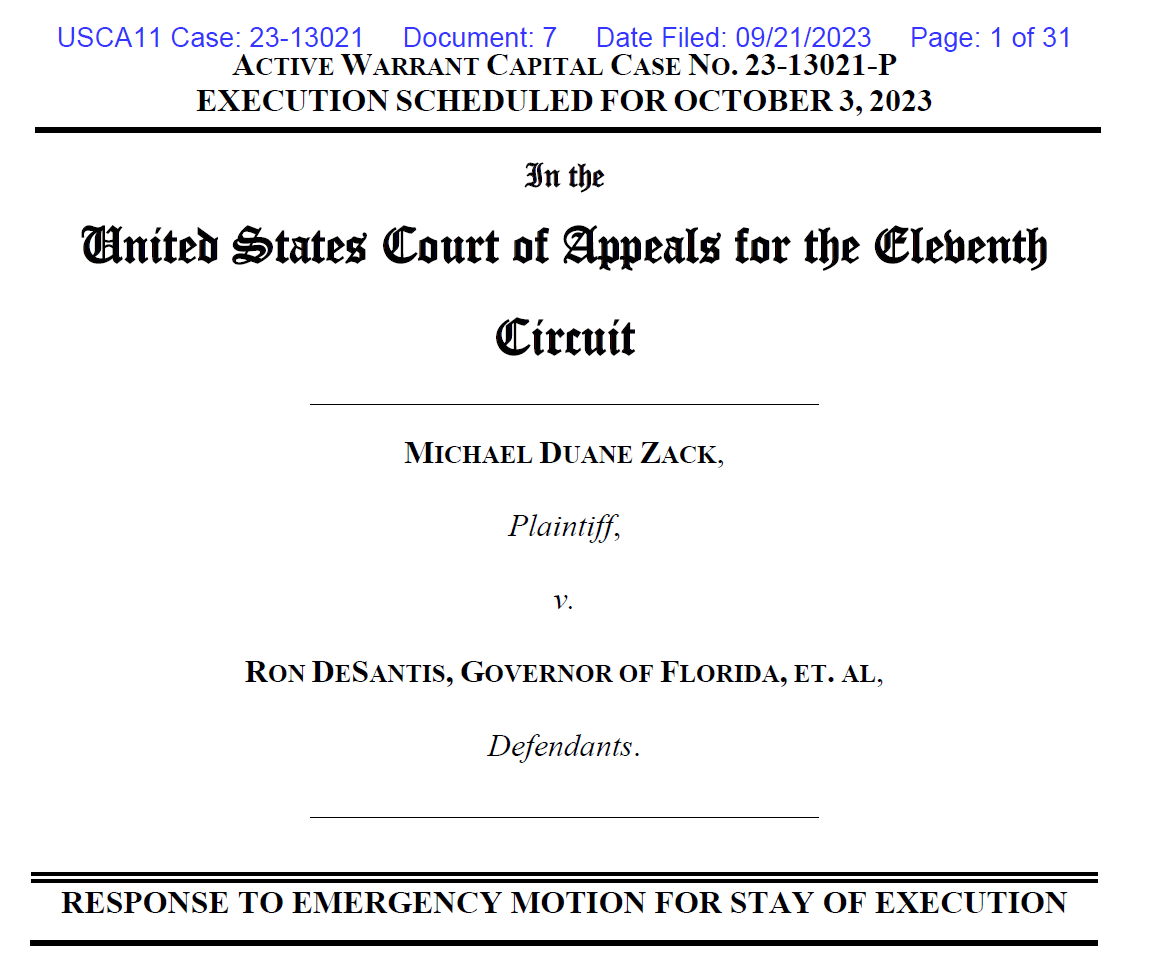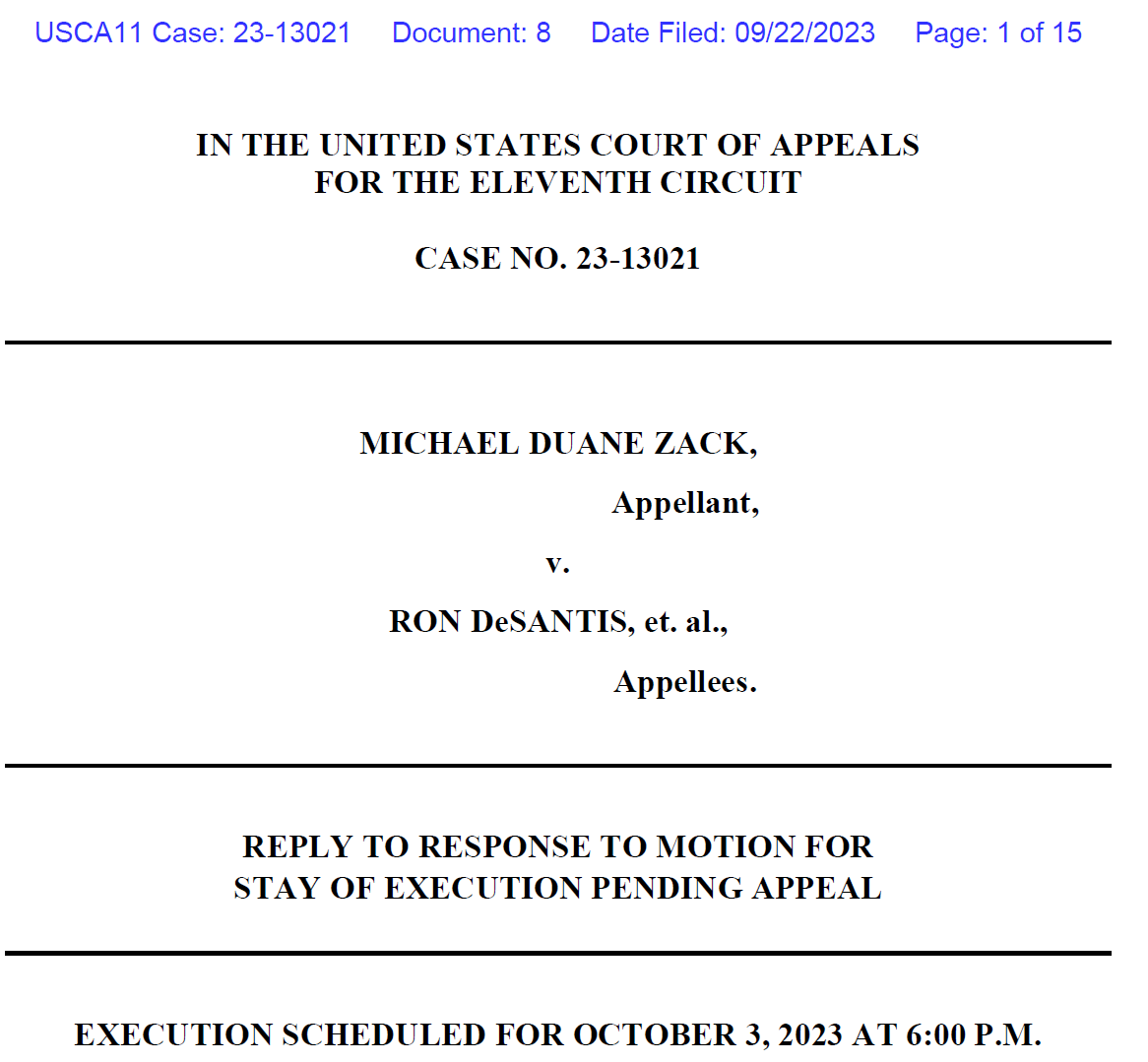Zack Warrant: Litigation Update
Michael Zack’s execution is scheduled for October 3—just over one week from today. He currently has claims pending in the Northern District of Florida and the Eleventh Circuit Court of Appeals.
Michael Zack’s execution is scheduled for October 3 at 6:00 p.m. EST—just over one week from today. He currently has claims pending in the U.S. District Court for the Northern District of Florida and the U.S. Court of Appeals for the Eleventh Circuit.
On Friday, the Florida Supreme Court denied his state court appeal. As of Saturday afternoon at 1:00 p.m., no petition for writ of certiorari had been docketed at the U.S. Supreme Court. Compared to the litigation related to the other executions in Florida this year, there is a lot more time between the Florida Supreme Court’s decision and the scheduled execution.
Federal District Court
In the district court, Zack filed an emergency motion for stay of execution, which the Court denied. The Court has not yet ruled on the merits of Zack’s petition, to which the State has filed a Motion to Dismiss.
Federal Circuit Court
On Sept. 17, Zack, through his attorneys, appealed the district court’s denial of his emergency motion for stay of execution to the Eleventh Circuit.
Zack’s Motion
Shortly after, on Sept. 19, Zack filed an Emergency Motion for Stay of Execution in the Eleventh Circuit.
In the Motion, Zack argues that he is entitled to a stay because he meets the standard for a stay pending appeal. The Motion explains that “[t]he medical community now recognizes FAS as identical to intellectual disability (ID) . . . . The ID-equivalence of FAS is so ubiquitous that Zack has a clinical diagnosis of ID.” The Motion argues that Zack “would be entitled to protections and benefits due to his disability” but has been denied protection in this instance due to an “outmoded” standard that is “rooted in white supremacy and eugenics . . .; at odds with science, education, and history . . .; and produces an absurd result . . . .”
As to clemency, the Motion notes that, “[a]t the time of Zack’s clemency interview and representation in 2013-2014, the scientific understanding of FAS and its relationship to ID did not exist . . . .” Therefore, Zack’s Motion explains:
“[N]o clemency decision-maker has contemplated the significant new understanding of Zack’s disability, which places him in the category of persons exempt from execution. With this new understanding, and with multiple courts refusing to vindicate the constitutional rights it implicates, Zack’s situation embodies the purpose of clemency.”
As to the State’s argument that clemency can be granted at any time, which the Motion argues is what the district court relied on in denying his Motion,1 the Motion argues:
This cannot be remedied by unsupported, illusory assurances that “clemency remains open” . . . and that Zack “may at any time up until the date of his execution” send documents to a footnoted address for the DeSantis administration’s review . . . . There is simply no time, no resources, no guidance, no rules, and no process for such a review to occur.
The full Motion can be downloaded here.
State’s Response
On Thursday (Sept. 21), the State filed its Response to Zack’s Motion.
The State argues that the Court should deny Zack’s Motion for six reasons:
First, Zack never tried to submit updated clemency materials either in the years intervening his initial clemency submission and clemency denial or after his warrant was signed. Second, Zack’s suit is nothing more than a speculative attempt to expand his minimal, clemency-related due process rights and attack settled precedent. Third, Zack’s suit does not have a substantial likelihood of success on the merits. Fourth, a stay would substantially harm the State. Fifth, a stay would be adverse to the public’s interest. And sixth, Zack would not be irreparably harmed absent a stay.
The State includes an argument that clemency is still possible, writing:
Although Governor DeSantis has denied Zack clemency, he still has complete and unfettered discretion, with the approval of two Clemency Board members, to grant Zack clemency “at any time, for any reason.” See Fla. R. Exec. Clemency 4 (emphases added).
The State also argues that the Rules of Executive Clemency are “non-binding” and “embody the Executive’s unlimited discretion to grant or deny clemency ‘at any time, for any reason.’” The State urges the Court to deny “Zack’s manipulative attempt to stay his execution after refusing to provide [the Governor] with the clemency-related materials he argues it lacks.”
The full Response can be downloaded here.
Zack’s Reply
On Friday (Sept. 22), Zack, through his attorneys, filed his Reply to the State’s Response.
Zack argues that he “has made the requisite showing” for a stay and “was under no obligation to submit unsolicited materials without any notice that clemency was being considered nearly a decade after his prior clemency proceedings, and the specific harm he asserts—that he was denied due process because he was functionally barred from access to the clemency process—is not speculative.”
The full Reply can be downloaded here.
As of Saturday afternoon at 1:30 p.m. a ruling had not been entered.
Prior TFDP Coverage of the Zack Warrant
The full background of Zack’s case is available here.
The Florida Supreme Court’s Scheduling Order
Beginning of trial court litigation here
The trial court’s Scheduling Order
The litigation related to public records is covered here.
Continuance due to Hurricane Idalia
The State’s responses to Zack’s motions in the trial court
A closer look at Fetal Alcohol Syndrome
Trial court denies Zack’s claims
Claims filed in federal court
State seeks to dismiss federal claims
Briefing begins at the Florida Supreme Court
Litigation update as of September 13
Litigation update as of September 17
Zack’s appeal from the federal court’s denial of a stay
Florida Supreme Court denies Zack’s appeal
My thoughts are with everyone involved in the warrant and execution process.
The Motion says: “[R]ather than accept the facts as true or allow evidentiary presentation, the district court relied on Defendants’ bare assertion that the clemency process remains ‘open’ to Zack.” (Citation omitted.)





